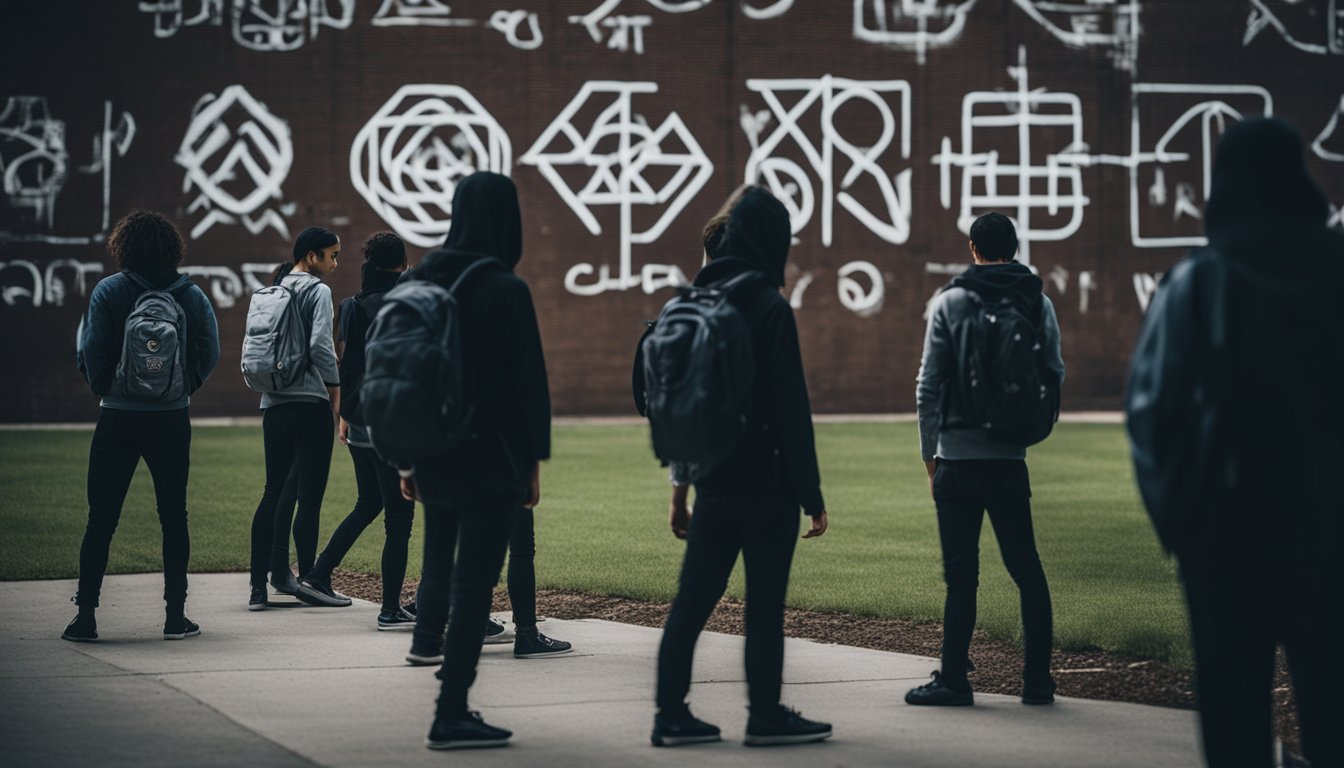8 True Crime Documentaries About Cults Preying on College Students
Unveiling the Dark Realities
Exploring the sinister world of true crime documentaries reveals a disturbing trend: cults preying on the vulnerability of college students. These documentaries shine a light on manipulative figures who exploit young adults during a crucial period of their lives.
Viewers gain insights into real-life stories of deceit and control, uncovering the psychological tactics used to ensnare innocent students. These films serve as a stark reminder of the dangers that can lurk even in educational institutions.
1) Wild Wild Country (2018)
"Wild Wild Country" unfolds the dramatic rise and fall of Bhagwan Shree Rajneesh, an Indian guru, and his followers in Wasco County, Oregon. This docuseries captures the tension between the cult and local residents, which escalated into a nationwide controversy.
The Rajneeshpuram community, built in the 1980s, aimed to establish a utopian society. Conflicts with local Oregonians intensified, resulting in a major legal battle and allegations of bioterrorism.
The series, divided into six episodes, explores the intricate dynamics within the cult, including the influence of Rajneesh's secretary, Ma Anand Sheela. Her actions and decisions played a crucial role in the unfolding events.
The filmmakers use extensive archival footage, interviews, and investigative journalism to present a comprehensive account. The series won an Emmy Award for Outstanding Documentary Series, underscoring its impact and storytelling quality.
Learn more about "Wild Wild Country" here.
2) Heaven's Gate: The Cult of Cults (2020)
This four-part docuseries presents an in-depth look at the infamous Heaven's Gate cult. It was led by Marshall Applewhite and gained notoriety for its belief in UFOs.
Heaven's Gate shocked the world with its mass suicide in 1997. The documentary uses firsthand accounts from former members and their loved ones.
The series uncovers how the cult preyed on vulnerable individuals, including college students, who were searching for meaning.
Heaven's Gate initially drew attention in 1975 when 20 people disappeared from a small town. The cult's promises of salvation and a higher existence in space attracted many dedicated followers.
3) Holy Hell (2016)
"Holy Hell" is a documentary directed by Will Allen.
It provides an inside look at the Buddhafield cult, where Allen served as an active member for over 20 years.
Allen's footage, captured during his time in the cult, offers a rare glimpse into the daily life and practices within Buddhafield.
The film exposes the charismatic leadership of Michel Rostand, the founder of Buddhafield.
Under Rostand's guidance, members believed they were on a spiritual path to enlightenment.
Over time, Allen reveals, through interviews and film, the psychological manipulation and abuse perpetrated by Rostand.
This documentary is notable for its firsthand account from a former member.
It offers an intimate and detailed perspective on how individuals are drawn into and become trapped within cult structures.
For more information, visit the "Holy Hell" page on IMDb.
4) Waco: American Apocalypse (2023)
"Waco: American Apocalypse" is a docuseries that revisits the harrowing 51-day standoff between the federal government and the Branch Davidians in 1993. This Netflix series delves into the siege led by cult leader David Koresh.
The incident took place at the group's compound in Waco, Texas, and resulted in a tragic loss of life. The Branch Davidians were a religious sect that drew a substantial following under Koresh's leadership.
The docuseries includes previously unseen footage and aims to shed light on the complex dynamics within the cult and the devastating federal operation that ended it. The Waco siege remains one of the most controversial encounters between a religious group and law enforcement in U.S. history.
Viewers can expect detailed accounts from survivors, law enforcement, and experts, offering a multifaceted view of the events that transpired.
For more information about "Waco: American Apocalypse," visit its Netflix page.
5) The Family
"The Family" (2016) is a documentary that delves into the shadowy world of an Australian cult, led by charismatic leader Anne Hamilton-Byrne.
She proclaimed herself the reincarnation of Jesus Christ. Under her control, the group adopted at least 28 children, indoctrinating them with her beliefs.
Hamilton-Byrne's methods were ruthless. She enforced strict discipline and administered hallucinogenic drugs to maintain control over her followers.
The documentary uncovers the psychological and emotional abuse endured by the cult’s victims.
It highlights the relentless efforts of authorities and concerned individuals to expose the cult and bring Hamilton-Byrne to justice.
Through interviews with former members, "The Family" paints a chilling picture of manipulation and abuse.
The film raises awareness about the dangers of unchecked power and the vulnerabilities of those seeking belonging.
For more information on "The Family," visit IMDb.
6) Jonestown: Terror in the Jungle (2018)
"Jonestown: Terror in the Jungle" offers an in-depth look at one of the most infamous cult tragedies in history. This docuseries examines the rise and fall of Jim Jones, the charismatic leader who founded the Peoples Temple.
The series delves into the manipulative tactics Jones used to control his followers, culminating in the horrific mass suicide at Jonestown in 1978. Over 900 men, women, and children lost their lives in this remote settlement in Guyana.
Featuring chilling interviews with survivors and newly declassified archival material, the series provides a comprehensive account of the events leading up to the massacre. It highlights how vulnerable individuals, including college students, were drawn into Jones's orbit through deceptive promises and psychological manipulation.
This powerful docuseries is a somber reminder of the dangers posed by cults and their leaders. It serves as a critical resource for those seeking to understand the mechanisms of control and coercion within these groups.
For more information, visit IMDb.
7) Children of God: Lost and Found (2007)
This documentary, created by former cult member Noah Thomson, offers a chilling look into the Children of God cult.
The film presents a firsthand account of life inside the cult, revealing the severe abuse and manipulation imposed on its members.
Noah Thomson escaped the cult and now uses his filmmaking to uncover the realities faced by other former members.
He embarks on a journey to connect with other survivors, sharing their stories of escape and the challenges they face in rebuilding their lives.
The documentary is a poignant exploration of the psychological and emotional toll on those who grew up within the organization.
It is available for viewing on platforms like Prime Video and Apple TV.
Learn more about Children of God: Lost and Found on IMDb.
8) The Vow (2020)
The Vow is an in-depth documentary series directed by Jehane Noujaim and Karim Amer. It explores NXIVM, a group initially marketed as a self-improvement and multi-level marketing company.
The series delves into the controversial practices and inner workings of NXIVM. It reveals how the organization evolved into a cult-like entity under the leadership of Keith Raniere.
The Vow provides access to former members and their experiences. It uncovers the manipulative and coercive methods used to control and exploit followers.
This nine-episode series is available on HBO Max and has received critical acclaim for its thorough investigation and compelling storytelling.
For more information, visit The Vow on IMDb.
Understanding Cults
Cults exploit psychological tactics to control members and use targeted recruitment methods to attract vulnerable individuals. Key points include the misuse of psychological manipulation and the strategic approaches in recruitment.
Psychological Manipulation
Cults prey on the human need for belonging and purpose. Leaders often use emotional abuse, gaslighting, and isolation to break down an individual's sense of self. Members are made to feel guilty or inadequate when questioning group doctrines, creating dependency on the cult for approval.
Brainwashing and mind control are advanced techniques used to indoctrinate members. Repeated rituals, chants, and confessions reinforce the leader’s ideas, making it challenging for individuals to think critically or independently. Over time, members may fully adopt the cult's beliefs, weakening their autonomy.
Recruitment Techniques
Cults often target college students due to their transitional life stage, which makes them more susceptible to new ideas and communities. Love bombing is one common technique, where recruits receive excessive praise and affection to foster a sense of belonging.
They also use front groups or shell organizations to mask their true intentions. Cults may offer free workshops or social events that appear harmless, only revealing their true nature once initial trust is established. This gradual introduction helps in minimizing initial resistance.
Furthermore, recruiters are skilled in identifying and exploiting personal weaknesses. They might pose as mentors or friends, offering solutions to personal problems, which strengthens the recruit's emotional attachment and reliance on the cult.
Impacts on College Students
Cult involvement can lead to severe mental health issues and disrupt academics and social lives, causing lasting effects on students and their futures.
Mental Health Effects
College students entangled in cults often experience a range of mental health challenges. Anxiety, depression, and post-traumatic stress disorder (PTSD) are prevalent among victims. For example, the Sarah Lawrence College cult exposed how manipulation and psychological control led students to develop deep emotional scars. Survivors frequently struggle with self-esteem, trust issues, and feelings of isolation.
The brainwashing tactics employed by cult leaders can induce paranoia and fear in students. Constant surveillance and manipulation undermine their sense of reality. These psychological consequences often necessitate long-term therapy and support.
Academic and Social Consequences
Academic performance often suffers due to cult involvement. Students may neglect studies, leading to declining grades and missed deadlines. The emotional turmoil and demands from cult activities reduce their ability to focus on coursework.
Socially, students become isolated from peers and family. Cult leaders often push members to sever ties with their support networks. This alienation leaves them dependent on the cult, further entrenching their involvement. It also disrupts their natural social development, affecting relationships long after leaving the cult.
Legal and Ethical Considerations
Cult activities targeting college students raise significant legal and ethical questions. The following explores laws against such activities and the ethical responsibilities of documentary filmmakers.
Laws Against Cult Activities
Cults often exploit vulnerable individuals. Various laws aim to protect potential victims from coercive practices. Laws addressing cult activities include anti-fraud statutes, coercion, and abuse laws. For instance, in the U.S., federal and state laws criminalize human trafficking, psychological manipulation, and exploitation.
University policies collaborate with the law to provide a safe learning environment. Institutions often have strict codes that prohibit any forms of coercive or manipulative behaviors. This ensures students are protected from fraudulent groups.
International laws also address these issues. Countries vary in their approach to defining and prosecuting cult activities. Prosecutions can fall under existing criminal laws, although some nations have specific regulations targeting harmful religious or pseudo-religious practices.
Ethical Issues in Documentary Filmmaking
Documentaries about cults prey on real, often harrowing experiences. Filmmakers must navigate ethical considerations responsibly. They must balance the need for truth-telling while respecting the subjects' privacy and well-being. Ensuring informed consent is crucial. Subjects need to understand the film's scope and impact.
Although artistic freedom is important, sensationalizing trauma for viewership is both unethical and insensitive. Filmmakers should refrain from exploitative practices. Additionally, presenting facts without bias helps maintain journalistic integrity.
When depicting traumatic experiences, ethical filmmakers provide support mechanisms for their subjects. This may involve counseling services or follow-ups to ensure their continued well-being. By addressing these ethical considerations, filmmakers inform the public without exacerbating the harm faced by survivors.








